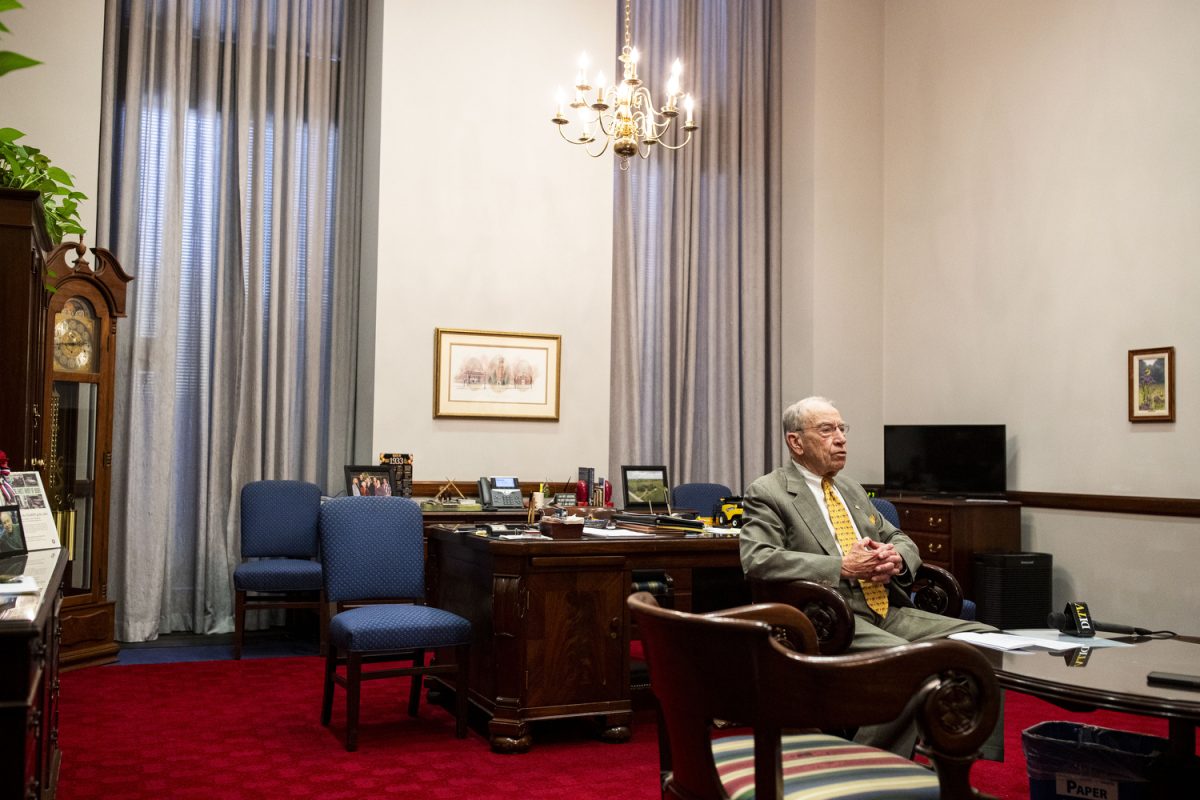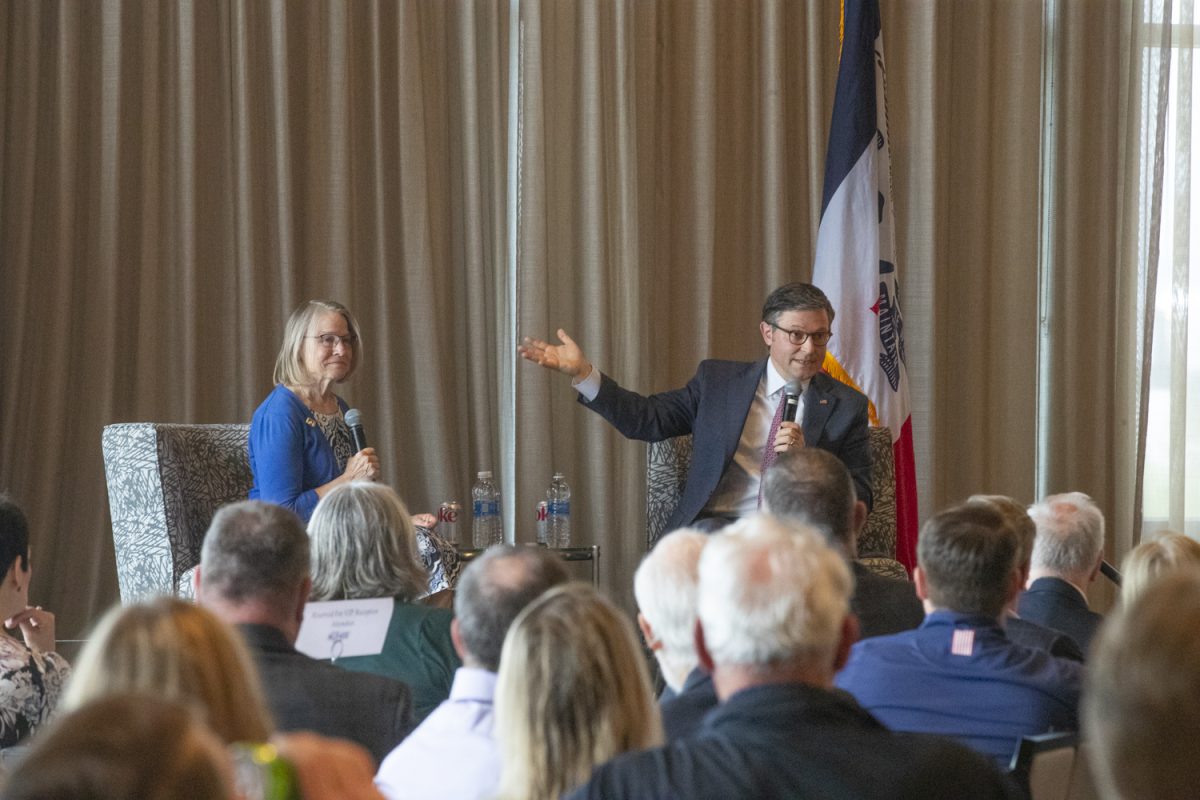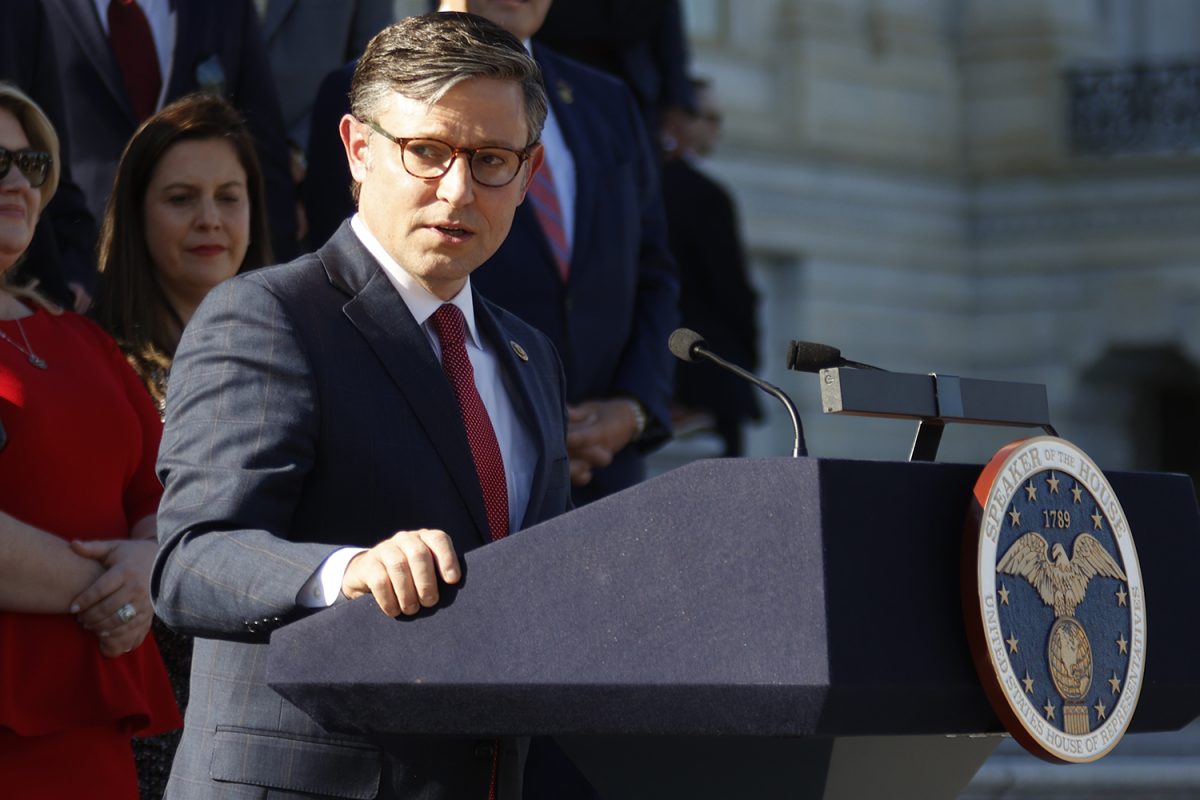WASHINGTON — The Daily Iowan sat down with U.S. Sen. Chuck Grassley, R-Iowa, at the nation’s capital, Grassley spoke about the impact of changes to FAFSA on farmers and small businesses, his recent discussions with Iowa high schoolers about legislation regarding TikTok, and putting “more farm in the farm bill.”
The interview has been edited for length and clarity.
The Daily Iowan: First, I just want to talk a little about your advocacy on the rollout of the new Federal Application for Student Aid, the FAFSA form. You were one of dozens of senators to sign a letter asking the Government Accountability Office to investigate the rollout of the form. How do you feel about the rollout?
Sen. Chuck Grassley: First of all, a little bit of history on it. It goes back to just before [U.S. Sen. Lamar Alexander R- Tennessee] retired from the Senate. So let’s say [2017] or [2018]. He says, “This is too complicated, we ought to make it a lot simpler to fill these forms out.” So this is something that ought to be easy. I’m not sure I can give you a reason why all of these complications. I just know it’s terribly upsetting to the colleges and the parents.
When you normally get this stuff done, I think in December, normally, and then it was supposed to start in March. Then there’s been problems since March and then since that was rolled out, there’s been something else crop up here. So at the earliest people might get this information by June, which isn’t really long enough. But I can’t address just exactly what the problems are with FAFSA.
But you think with our big education bureaucracy we have, they ought to have the resources to get it done and get it done on time. There is one issue, though, that I took with it. I don’t know whether it’s more of a policy issue than it is — it’s a policy substance issue as opposed to a mechanical thing that we’re dealing with a form and that is that they’re trying to set.
I think — let me start over again. I think this affects small businesses and agriculture. Where they want to, in other words, if you have a lot of capital in farming and a lot of capital in small business, that ought to have something to do with whether or not you’d qualify for student aid.
Well, I know a little about agriculture, you can have a lot of capital invested, and you might be losing money. I mean between 2013 and 2019, or maybe it was eight, 20. There were five years that farmers weren’t making any money, and then you got to send your kids to college. Are you supposed to sell a part of the farm to do it, or go into debt to do it?
Well, we’re trying to help people not to do that. So that’s something we’ve been fighting, but it’s kind of unrelated to these mechanical problems.
Learn more here:
On that note, you requested the GAO investigate. Why did you feel that it was necessary for the GAO to look into the rollout?
GAO, I mean, they’re a big organization, they work for the Congress, the United States. They have great investigation capabilities. So I got a staff of 25 people here and maybe three or four of them work in legislation and we don’t have the expertise, so you go to GAO for a lot of things.
I’ll bet you in the course of a year, you’ll find me writing 20 letters to GAO to help us with this or help us with that because of the expertise they have. Institutional knowledge — I shouldn’t say institutional knowledge — the capability of getting the knowledge we need.
Experts have said that changes in the underlying formula brought by the FAFSA Simplification Act could result in less aid for students with siblings in college. How do you feel about how the changes affect those families?
Well, I think I addressed one of them already, small business agriculture. I’m not sure that I know what the other one is.
Some experts say that the underlying formula could result in some students who have another one of their siblings in college could see less institutional aid, and stuff like that based on some of the calculation changes.
Oh yeah, I think what I’m talking about with small businesses and with farmers. If you got more than one kid in college, it’s probably going to make it very difficult for you to have both those kids go to college if you don’t have the income. If you’re supposed to sell the farm or compromise the business, it seems to bring a whole new factor into it.
In fact, a year ago in January, so this has been something at least for almost 18 months that we’ve been brought to our attention, by guess who: the community colleges and the private colleges of Iowa more than the state institutions in Iowa. And, it’s just been fearful of what it’ll do to their enrollment. When you count on a certain amount of tuition income coming in, and it doesn’t come in, it’s a problem for the people who run the universities.
We heard it from the universities, colleges, and community colleges before we heard from parents.
The House passed a bill that could potentially ban TikTok on March 13. The bill is now waiting for Senate approval. Do you support the fast-tracking of this bill?
If it actually goes through committee, even if it takes a week or two as opposed to six months, the committee process in and of itself is an important process. And anything that goes through committee, I wouldn’t call it fast-tracking.
But there is, maybe there’s reason to assume it should be fast-tracked in the sense of getting committee work done because of the influence it could have on the upcoming election.
And I’ll explain, first of all, I need to answer your question. I support the bill the way it went through the House, but if it changes in the Commerce Committee, I better wait until it comes out of the Commerce Committee and read that before I tell you if I’m going to vote for the bill in the Senate.
And also, to make it clear to the 170 million people that use TikTok that we don’t want to destroy the platform.
We just want it to be owned by an American company so it can be used the same way people use it without the influence of the Chinese Communist Party in the process.
So, getting back to answering your question, where I changed direction. I guess I would say some evidence of the influence that the Chinese government can have on the things in the United States, so somebody in China that runs the company TikTok, or it’s a part of ByteDance that run it, but they said — well I’m paraphrasing what they said — but they said, this bill will pass the House of Representative if we don’t get on it right away, so we’ll get the people on TikTok to call your congressman and say not vote for the bill.
It had so much influence it shut down the phone lines in the House of Representatives. So, hypothetically, would you want some group of people to have the same influence on Nov. 4, the day before the election, to say get a hold of TikTok and spread this disinformation?
So it looks to me like we ought to look at it from two standpoints. One would be the privacy of the 170 million people who use it. You would want that privacy if it’s going to be accumulated to be kept here in the United States.
Secondly, and I haven’t been briefed by the intelligence people on this, but I’ve heard enough about the influence it could have on our national security. For national security reasons, I think we wouldn’t want Chinese Communists to have this information.
And by the way, I probably visited three or four high schools during the break to answer questions for students. In two of those schools, TikTok came up, and I was kind of expecting TikTok to come up, that I would have a violent outburst of high school students that you shouldn’t be affecting TikTok.
RELATED: Grassley discusses his bipartisan bill that would up the number of legal immigrants at IC townhall
I never felt that we got that sort of a reaction. Instead, as I just explained to you, kind of a nodding of head, that maybe my reasons for questioning TikTok and how it operates and the legitimacy of the legislation as some acceptance of what we’re trying to do.
But I didn’t have anybody say to me “you can’t destroy TikTok.” We aren’t destroying it, we’re gonna just have it sold. But I didn’t get that sort of an answer, and from people that are high school age. Isn’t that about the age group where most of the people use it?
The farm bill fizzled out back in September. The Senate has been working on the bill, however, it is not a top priority in the Senate right now. What are your thoughts on that?
I believe that we’re going to have another one-year extension. So the 2018 farm bill now is in its sixth year, I think it’ll be in its seventh year and hopefully get a five-year farm bill passed for [2025]. Well, it’d be [2026, 2027, 2028, 2029, 2030].
Farmers need certainty. What’s holding it up is trying to get a bipartisan agreement to do what we on the Agriculture Committee call putting more farm into the farm bill.
The farm bill, historically, has been kind of divided — 85 percent food stamps, 15 percent agriculture. Not meaning that 15 percent goes into the farmer’s pocket because the Department of Agriculture as a whole and the programs within it, and not necessarily just support prices.
The reason we take a position to put more “farm in the farm bill” is because the 2018 farm bill doesn’t reflect the inflation that we’ve had in biodiesel, fertilizer, feed, seed, chemicals, and interest rates. The prices that were set in the 2018 farm bill doesn’t reflect that and we need to have a reflection of the inflation.
That’s what’s keeping us from getting a bipartisan agreement. All farm bills passing the United States Senate, in all the years I’ve been a member of the Senate, have been bipartisan, very bipartisan.
If you hear as I’m hearing today, for the first time, that the House may put out a farm bill. I think that’s good news that they would do that. I’m glad that they’re doing it, but I don’t think it’s going to impact until we get a bipartisan agreement here in the United States Senate.










